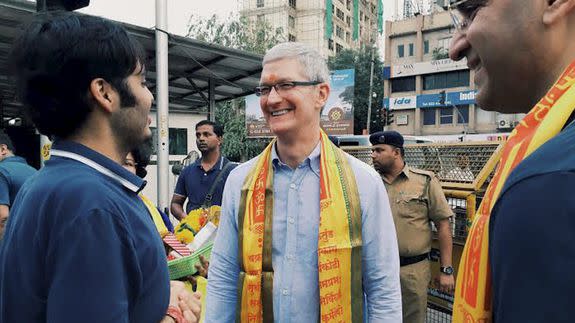Apple bets on Reliance Jio as iPhone sales in India increase 50%

India is continuing to show growth in iPhone sales, as most other countries including China are slowing down. The sales of iPhone grew by more than 50 percent in the country during the most recent year. "We believe we're just beginning to scratch the surface of this large and growing market opportunity," Tim Cook said. Apple CEO now believes he has found a new way to further accelerate sales of iPhone in India.
SEE ALSO: Apple partners with Flipkart ahead of iPhone 7 launch in India
At company's earnings call for the fiscal fourth quarter, Apple chief said the recent improvements in infrastructure and penetration of 4G LTE networks in India could further boost iPhone sales. The company has partnered with Reliance Jio, a new '4G only' telecom network by India’s largest industrial house. Owners of iPhone 7 and iPhone 7 Plus who opt for Reliance Jio network get a year of data services at no charge.
"Looking ahead, we’re seeing some very exciting developments in India. Reliance Jio is rolling out a a first of its kind all-IP network in India with 4G coverage in 18,000 cities and 200,000 villages across the country," Cook said. "They’re offering a free year of service to purchasers of new iPhones and we’re partnering with them to ensure great iPhone performance on their network."
Analysts beg to differ, however.
Apple's bet to lure customers to buy an iPhone 7 or iPhone 7 Plus with free data isn't going to be of much help, Tarun Pathak, Senior Analyst with Counterpoint Research told Mashable India.
"An average user buying the iPhone 7 will be less concerned about the data plans," he said, adding that they would be more interested in enticing payment options. Pathak says unavailability of 4G LTE network wasn’t preventing people from purchasing an iPhone — it was price. If the company really wants to sell more iPhones in India, it should focus on making iPhones available in $300-$400 price range, Pathak added.
In fact, the growth of sales that Apple has seen in India is also because of a "low-cost" iPhone. "Nearly half of the iPhones Apple sold in India in the financial year it just closed were four-year-old iPhone 5s models," Pathak said. The company's recently launched smartphones, which are more expensive aren't faring that well, he added.
"The only device they seem to be selling well in India is iPhone 5s and it is likely to disappear from the market soon," Pathak said. Apple sold 2.5 million iPhones in India in the recently concluded fiscal year, according to Counterpoint Research. Apple’s market share in India as of Q3 2016 is 1.4 percent, according to the same estimation.
"We estimate that iPhone SE will take iPhone 5S’ slot in two to three quarters in India and play a role in generating volume for Apple," he said. The starting price of the iPhone SE is Rs 39,000 ($585) in India. Its retail price is lower than those of last year's iPhone 6s, and this year's iPhone 7.
Although India is the second largest smartphone market, the vast majority of people in the country purchase affordable and mid-range smartphones. "Premium segment continues to be a niche segment in India contributing only seven percent by volume and 17 percent by value," Pathak said. Counterpoint Research categorizes phones priced above Rs 30,000 ($450) under 'premium' category.
That's not to say that Apple hasn't explored the idea of selling low-cost iPhones in India. Earlier this year, the company proposed plans to sell refurbished iPhones in the country. This would have allowed it to sell newer iPhones at much cheaper price points. But the idea of selling used or refurbished phones didn't sit well with the Indian government, which rejected the proposal over concerns that these inventories will add up to the country's e-waste.
It also doesn't help that India has some of the toughest import duty laws, which in turn, makes iPhones (as well as other electronic gadgets by foreign brands) more expensive to purchase. India is among the most expensive places to purchase an iPhone 7, for instance.
Apple is also trying to ensure its products are returning enough profits and maintaining the brand value. The company partnered with India’s largest ecommerce Flipkart ahead of sales of iPhone 7 and iPhone 7 Plus in the country. Apple doesn’t directly sell its products in India and instead relies on third-party distributors and suppliers. This model worked well for years, but lately as the ecommerce industry in India started to heat up, Apple has been on the receiving end of big discounts that these companies offer to customers to gain GMV, or Gross Merchandise Value.
Moving forward, Apple would want to open its iconic stores in India to improve its brand image and reach in the country. The Indian government in June announced a three-year relaxation to Apple and other foreign companies who want to have retail stores in India. Prior to this, the government required companies to source 30% of their goods from within India.

 Yahoo News
Yahoo News 